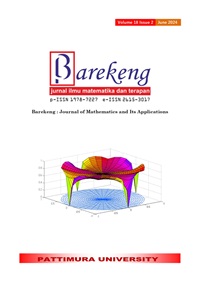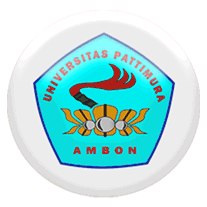SPATIAL MODELING OF POVERTY IN BENGKULU PROVINCE WITH MIXED GEOGRAPHICALLY WEIGHTED REGRESSION
Abstract
The percentage of poor people in Bengkulu Province is high from year to year. The poverty rate in Bengkulu Province also tends to fluctuate. If there is a decrease in the poverty rate, the decrease is relatively small. Poverty in the regions of Bengkulu Province also varies from district to district, subdistrict, and village to village, because poverty data is spatial data that varies regionally. The diversity of poverty data in Bengkulu Province is influenced by spatial effects, namely spatial dependency and spatial heterogeneity. Spatial dependency occurs due to spatial error correlation in cross section data, while spatial heterogeneity occurs due to random area effects, which is the difference between one region and another. Therefore, classical methods are not qualified enough to analyze the resulting diversity. This research will model the poverty of each district/city in Bengkulu Province using Mixed Geographically Weighted Regression (MGWR), because this method is quite complex in modeling data that contains spatial heterogeneity and variations in geospatial data. This modeling aims to identify and analyze poverty indicators in Bengkulu Province spatially, namely based on poverty data in each district/city in Bengkulu Province. The results showed that by using the MGWR method, the variables that locally influence the percentage of extreme poor people in each district/city in Bengkulu Province are Female Household Head Gender and not having a waterheater . Meanwhile, the variable that has a global effect on the percentage of the extreme poor in each district/city in Bengkulu Province is not having a flat screen television ().
Downloads
References
BPS, "Profil Kemiskinan di Indonesia Maret 2023," Badan Pusat Statistika, Jakarta, 2023.
BPS, "Profil Kemiskinan Provinsi Bengkulu," Badan Pusat Statistik, Bengkulu, 2023.
L. Anselin, “Lagrange Multiplier Test Diagnostics for Spatial,” GeographicalAnalysis, vol. 20, pp. 1-17, 1988.
H. Yasin, B. Warsito and A. R. Hakim, "Pemodelan Pertumbuhan Ekonomi di Provinsi Banten menggunakan Mixed Geographically Weighted Regression," Media Statistika, vol. 11, no. 1, pp. 53-64, 2018.
X. Wang, S. Shi, X. Zhao, Z. Hu, M. Hou and L. Xu, "Detecting Spatially Non-Stationary between Vegetation and Related Factors in the Yellow River Basin from 1986 to 2021 Using Multiscale Geographically Weighted Regression Based on Landsat," MDPI, vol. 14, no. 24, pp. 1-20, 2022.
I. Sriliana, E. Sunandi and U. Rafflesia, "The Poverty Modeling Using Small Area Estimation with Semiparametric P-spline (a case study: Poverty in Bengkulu Province)," Asian Journal of Applied Sciences, vol. 6, no. 4, pp. 166-174, 2018.
D. S. Rini, I. Sriliana and H. Fransiska, "The Poverty Modelling in Bengkulu Province using Geographically Weighted Logistic Regression," in The 2nd International Conference On Science and Technology, 2019.
M. Y. Darsyah, R. Warsono and M. F. Agustina, "The Model of Mixed Geographically Weighted Regression (MGWR) for Poverty Rate in Central Java," International Journal of Applied Mathematics and Statistics, vol. 536, 2015.
N. Lutfiani, S. and S. Mariani, "PEMODELAN GEOGRAPHICALLY WEIGHTED REGRESSION (GWR) DENGAN FUNGSI PEMBOBOT KERNEL GAUSSIAN DAN BI-SQUARE," UNNES Journal of Mathematics, vol. 8, pp. 82-91, 2019.
S. H. Daulay and E. Simamora, "PEMODELAN FAKTOR-FAKTOR PENYEBAB KEMISKINAN DI PROVINSI SUMATERA UTARA MENGGUNAKAN METODE GEOGRAPHICALLY WEIGHTED REGRESSION (GWR)," Jurnal Riset Rumpun Matematika dan Ilmu Pengetahuan Alam, vol. 2, pp. 47-60, 2023.
P. L. Ari Dewi and I. Zain, "Pemodelan Faktor Penyebab Kecelakaan Lalu Lintas Berdasarkan Metode Geographically Weighted Regression di Jawa Timur," JURNAL SAINS DAN SENI ITS , vol. 5, pp. 58-64, 2016.
S. M. Meutuah, H. Yasin and D. A. I. Maruddani, "PEMODELAN FIXED EFFECT GEOGRAPHICALLY WEIGHTED PANEL REGRESSION UNTUK INDEKS PEMBANGUNAN MANUSIA DI JAWA TENGAH," JURNAL GAUSSIAN, vol. 6, pp. 241-250, 2017.
T. W. Utami, A. Rohman and A. Prahutama, "PEMODELAN REGRESI BERGANDA DAN GEOGRAPHICALLY WEIGHTED REGRESSION PADA TINGKAT PENGANGGURAN TERBUKA DI JAWA TENGAH," MEDIA STATISTIKA, vol. 9, pp. 133-147, 2016.
A. Maulani, N. Herrhyanto and M. Suherman, "Aplikasi Model Geographically Weighted Regression (GWR) Untuk Menentukan Faktor-Faktor yang Mempengaruhi Kasus Gizi Buruk Anak Balita di Jawa Barat," Eurekamatika, vol. 4, pp. 46-63, 2016.
A. . M. Dzikrina and S. W. Purnami, "Pemodelan Angka Prevalensi Kusta dan FaktorFaktor yang Mempengaruhi di Jawa Timur," JURNAL SAINS DAN SENI POMITS, vol. 2, pp. 275-281, 2013.
W. Härdle, Smoothing Techniques: With Implementation in S, New York: Cambridge University Press, 1991.
Y. Sutro and S. Martha, "PEMODELAN FIXED EFFECT GEOGRAPHICALLY WEIGHTED PANEL REGRESSION UNTUK INDEKS PEMBANGUNAN MANUSIA DI KALIMANTAN BARAT," Bimaster, vol. 9, pp. 413-422, 2020.
A. S. Fotheringham, C. Brunsdon and M. Charlton, Geographically Weighted Regression: The Analysis of Spatially Varying Relationships, England: John Wiley & Sons, 2002.
S. Lee, D. Kang and M. Kim, "Determinants of Crime Incidence in Korea: A Mixed GWR Approach," in In World Conference of the Spatial Econometrics Association, 2009.
F. Pongoh, I. M. Sumertajaya and M. N. Aidi, "Geographichal Weighted Regression and Mix Geographichal Weighted Regression," International Journal of Statistics and Applications, vol. 5, pp. 1-4, 2015.
D. Hanum and Purhadi, "Faktor-faktor yang Mempengaruhi Morbiditas Penduduk Jawa Timur dengan Multivariate Geographically Weighted Regression (MGWR)," JURNAL SAINS DAN SENI POMITS, vol. 2, pp. 189-194, 2013.
A. R. Hakim, H. Yasin and S. , "Pemodelan Persentase Penduduk Miskin di Kabupaten dan Kota di Jawa Tengah dengan Pendekatan Mixed Geographically Weighted Regression," JURNAL GAUSSIAN, vol. 3, pp. 575-584, 2014.
Copyright (c) 2024 Sigit Nugroho, Dyah Setyo Rini, Tommy Jomecho, Cinta Rizky Oktarina, Stevy Cahya Pratiwi, Elisabeth Evelin Karuna

This work is licensed under a Creative Commons Attribution-ShareAlike 4.0 International License.
Authors who publish with this Journal agree to the following terms:
- Author retain copyright and grant the journal right of first publication with the work simultaneously licensed under a creative commons attribution license that allow others to share the work within an acknowledgement of the work’s authorship and initial publication of this journal.
- Authors are able to enter into separate, additional contractual arrangement for the non-exclusive distribution of the journal’s published version of the work (e.g. acknowledgement of its initial publication in this journal).
- Authors are permitted and encouraged to post their work online (e.g. in institutional repositories or on their websites) prior to and during the submission process, as it can lead to productive exchanges, as well as earlier and greater citation of published works.






1.gif)



